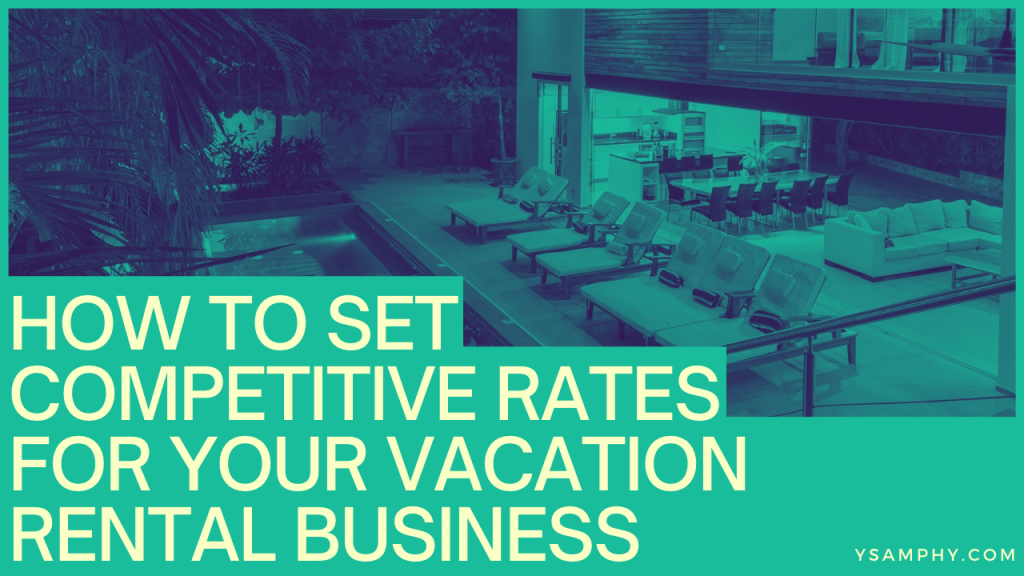The global vacation rental industry has experienced profound changes over the past several years, with more travelers ditching prepackaged tours in favor of personalized experiences. Thanks to platforms like Airbnb, Vrbo, and many others, vacation rental businesses that can meet this demand have found a much higher growth ceiling than was once available.
However, the increased profitability of vacation rentals has predictably resulted in a rather crowded market. These days, you’re likely to have more than your fair share of competitors, regardless of which price brackets you’re targeting. Fortunately, this doesn’t mean that your rental business’s growth has to stagnate. Rather, you may just have to be a bit more proactive when setting your rates.

Let’s look at how you can more effectively set your vacation properties’ rental rates in today’s extremely competitive climate:
1. Leverage a Vacation Rental Channel Manager
For rental businesses with multiple properties, simply keeping track of how much to charge for each rental property can be difficult enough. Once you have more than just a couple of rentals, you should consider integrating a vacation rental channel manager immediately to simplify and sync your pricing and other workflows across different online travel agencies (OTAs). This way, you can guarantee pricing consistency across your entire online presence and better maximize occupancy rates.

2. Use Real-Time Dynamic Pricing Tools
Some channel managers also come with integrated dynamic pricing tools or the capability to connect to third-party software. In any case, having these tools on hand will help you adjust your rates based on various factors such as demand, occupancy rates, special events, seasonal fluctuations, and competition. More advanced tools can analyze market data and make real-time adjustments, similar to standard industry practices for pricing plane tickets and hotel rooms.

3. Monitor Your Closest Competitors’ Rates
If competitors are adjusting their rates, analyze why and see if similar adjustments could benefit your properties. Your competitors’ rates are a useful benchmark for your own prices and may also provide insights into market trends.
Apart from monitoring competitors in your immediate price bracket, it could also be handy to look at what those occupying the markets immediately above and below your rentals are doing. That way, you can more easily spot opportunities for pivoting if more upscale or downscale rentals prove more profitable.

4. Keep Analyzing the Market
Your competitors may not necessarily know what they’re doing, which means it’s important to get a bigger picture by conducting periodic market research. Consider factors like location, amenities, property size, and seasonality, and see if any year-over-year trends may be impacting your properties’ potential profitability. An integrated vacation rental manager should help you spot critical market trends easily.

5. Understand Seasonality
With very few exceptions, seasonality plays a significant role in pricing for vacation rentals. Summer months, holidays, and local events almost always allow you to set higher rates due to increased demand and reduced supply. Conversely, off-peak times may require you to lower your prices to attract guests and maintain profits.
As a rule, your rentals’ yearly plans should always account for these to maximize their potential, especially since your properties’ suppliers may also charge seasonal rates. Make sure these trends are reflected in your vacation rental manager so that seasonal rates change on all your OTAs.

6. Evaluate Your Running Costs
Maximizing earnings is just part of ensuring profitability. You also want to look at your expenses so that you’re sure every dollar spent is meaningfully growing your business.
Be sure to accurately account for all business costs, including mortgage, maintenance, cleaning, utilities, and platform fees. Make sure your rates cover these costs while also providing a profit margin. As mentioned, consider the seasonal costs of various business inputs and try to develop a relationship with suppliers to keep your expenses low. Some vacation rental channel managers already come with functionality to help you track all your business expenses and other inputs.

7. Be Smart with Guest Feedback
You can run efficient, optimally priced properties, but growth will elude your business if it does not consistently delight its guests. Without markedly positive experiences, guests are unlikely to recommend your property, let alone come back. This is all to say that, in this industry, “good enough” is unacceptable.
To build a stellar reputation, make smart use of guest feedback. A lot of newbie property managers will try to quash criticism. However, these critiques are actually opportunities to improve your business. Address any recurring issues to increase your rentals’ perceived value so that you can justify better rates down the line. Make sure to adopt vacation software that comes with guest relationship management functions so that you can respond to feedback as it arrives.

Competitive Vacation Rental Pricing is Challenging But Necessary
Given the intense competition in the vacation rental space, you must do whatever you can so that your properties stand out for their experiences and value. Fortunately, this does not mean that you have to compromise profitability. With these strategies, you should be able to reduce the risks and opportunity costs associated with shifting prices to meet demand. While setting competitive rates for your vacation rental business will be a process of trial and error, these vetted approaches will help guarantee your rental business’s lasting success in the vacation and hospitality market.

